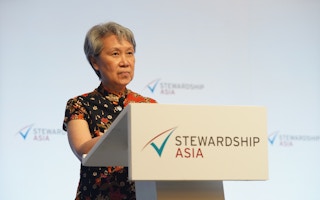Companies need to take responsibility for the skills workers need to stay employed in a world where jobs are being disrupted by technology, the boss of one of Asia’s largest investment firms said this week.
To continue reading, subscribe to Eco‑Business.
There's something for everyone. We offer a range of subscription plans.
- Access our stories and receive our Insights Weekly newsletter with the free EB Member plan.
- Unlock unlimited access to our content and archive with EB Circle.
- Publish your content with EB Premium.
Speaking at the Stewardship Asia Roundtable 2018 on Monday, Ho Ching, executive director and chief executive officer of Singapore sovereign wealth fund Temasek Holdings, said businesses should stop “outsourcing” the skills crunch problem to governments and step up to ensure their workers stay employable over the long term.
She pointed out that companies have profited from human capital that has been trained in schools and colleges, funded by governments and families, but are not preparing their workers for jobs of the future that they do not have the skills to do.
“We should not take the easy way out to retrench the obsolete, when technologies change. We should not throw the problem of skill obsolescence to governments and societies,” she said.
“Businesses should not outsource away our responsibilities as a key stakeholder for the common good.”
Ho, who was named one of the world’s powerful women by Forbes in 2016, said that the impact of technology on work is one of the biggest disruptions that mankind has ever faced, and called the transition to a digital world “very unsettling.”
“Businesses, government and civic societies must help our workforce navigate through the disruptive transformation,” she said. “Individuals, too, need to prepare themselves to move beyond their comfort zones and learn new skills.”
“
Businesses should not outsource away our responsibilities as a key stakeholder for the common good.
Ho Ching, executive director and chief executive officer, Temasek Holdings
Ho also called on companies to support the United Nations’ Sustainable Developments Goals, which aim to create a better and more inclusive world by 2030.
Learning to learn
Her comments came in the week that a report commissioned by Temasek, Learning to Learn: Adapting to Continuous Workforce Disruption, was launched.
It warned that 85 per cent of jobs in Asia will be transformed by technology in the next three years. Today’s 20-year olds living in Asia have a 50 per cent chance of living until they are 100, and will need to make sure they have the skills needed to keep working for 60-70 years, the report said.
It recommended that businesses partner with governments and educators to ensure that workers’ skills stay relevant and transferable across different jobs, employers and careers.








